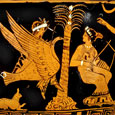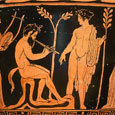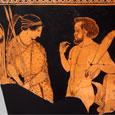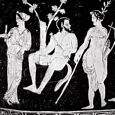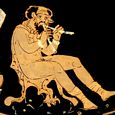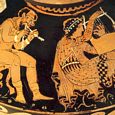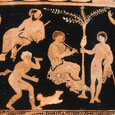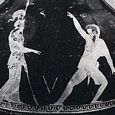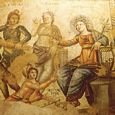MARSYAS
Greek Name
Μαρσυας
Transliteration
Marsyas
Latin Spelling
Marsyas
Translation
--
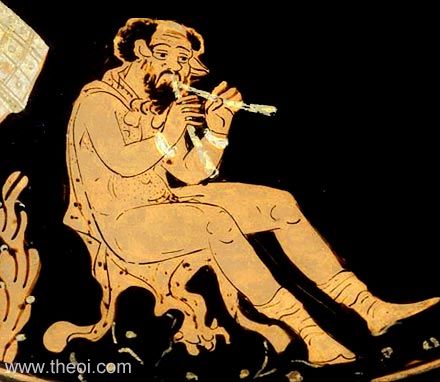
MARSYAS was a Phrygian Satyr who invented the music of the flute. He found the very first flute which had been crafted but cast away by the goddess Athena who had been displeased by the bloating of the cheeks. Marsyas later challenged the god Apollon to a musical contest but lost when the god demanded they play their instruments upside-down in the second round--a feat ill-suited to the flute. As punishment for his hubris, Apollon had Marsyas tied to a tree and flayed alive. The rustic gods then transformed him into a stream.
The story of Marsyas' contest with Apollon is sometimes told of the Arkadian god Pan. Marsyas was also connected with the flute-playing Tityroi satyrs in the train of the god Dionysos.
FAMILY OF MARSYAS
PARENTS
[1] A NYMPHE (Telestes Frag 805)
[2] OLYMPOS (Apollodorus 1.24, Ovid Metamorphoses
6.382)
[3] OIAGROS (Hyginus Fabulae 165)
ENCYCLOPEDIA
MA′RSYAS (Marsuas), a mythological personage, connected with the earliest period of Greek music. He is variously called the son of Hyagnis, or of Oeagrus, or of Olympus. Some make him a satyr, others a peasant. All agree in placing him in Phrygia. The following is the outline of his story, according to the mythographers. Athena having, while playing the flute, seen the reflection of herself in water, and observed the distortion of her features, threw away the instrument in disgust. It was picked up by Marsyas, who no sooner began to blow through it than the flute, having once been inspired by the breath of a goddess, emitted of its own accord the most beautiful strains. Elated by his success, Marsyas was rash enough to challenge Apollo to a musical contest, the conditions of which were that the victor should do what he pleased with the vanquished. The Muses, or, according to others, the Nysaeans, were the umpires. Apollo played upon the cithara, and Marsyas upon the flute; and it was not till the former added his voice to the music of his lyre that the contest was decided in his favour. As a just punishment for the presumption of Marsyas, Apollo bound him to a tree, and flayed him alive. His blood was the source of the river Marsyas, and Apollo hung up his skin in the cave out of which that river flows. His flutes (for, according to some, the instrument on which he played was the double flute) were carried by the river Marsyas into the Maeander, and again emerging in the Asopus, were thrown on land by it in the Sicyonian territory, and were dedicated to Apollo in his temple at Sicyon. (Apollod. Bibl. i. 4. § 2; Palaeph. de Incredib. 48; Liban. Narrat. 14, p. 1104; Nonn. Narrat. ad Greg. Invect. ii. 10, p. 164; Diod. iii. 58, 59; Paus. ii. 7. § 9; Herod. vii. 26; Xen. Anab. i. 2. § 8; Plut. de Fluv. 10; Hygin. Fab. 165; Ovid, Metam. vi. 382, 400.) The fable evidently refers to the struggle between the citharoedic and auloedic styles of music, of which the former was connected with the worship of Apollo among the Dorians, and the latter with the orgiastic rites of Cybele in Phrygia. It is easy to apply this explanation to the different parts of the legend; and it may be further illustrated by other traditions respecting Marsyas. He is made by some the inventor of the flute, by others of the double flute. (Plut. de Mus. p. 1132, a.; Suid. s. v. ; Athen. iv. p. 184, a., xiv. p. 616, 617; Plin. H. N. vii. 56.) By a confusion between the mythical and the historical, the flute-player Olympus is made his son, or by some his father. He is spoken of as a follower of Cybele (Diod. l. c.), and he occupies, in fact, the same place in the orgiastic worship of Cybele that Seilenus does in the worship of Dionysus: Pausanias (l. c.) actually calls him Seilenus, and other writers connect him with Dionysus.
The story of Marsyas was often referred to by the lyric and epigrammatic poets (Bode, Gesch. d. Lyr. Dichtk. vol. ii. pp. 296, 297; Brunck, Anal. vol. i. p. 488, vol. ii. p. 97), and formed a favourite subject for works of art. (Müller, Archäol. d. Kunst, § 362. n. 4.) In the fora of ancient cities there was frequently placed a statue of Marsyas, with one hand erect, in token, according to Servius, of the freedom of the state, since Marsyas was a minister of Bacchus, the god of liberty. (Serv. in Aen. iv. 528.) It seems more likely that the statue, standing in the place where justice was administered, was intended to hold forth an example of the severe punishment of arrogant presumption. (Böttiger, Kleine Schriften, vol. i. p. 28.) The statue of Marsyas in the forum of Rome is well known by the allusions of Horace (Sat. i. 6. 120), Juvenal (Sat. ix. 1,2),and Martial (ii. 64. 7). This statue was the place of assembly for the courtezans of Rome, who used to crown it with chaplets of flowers. (Plin. H. N. xxi. 3; Senec. de Benef. vi. 32; Lipsins, Antiq. Lect. 3.)
Source: Dictionary of Greek and Roman Biography and Mythology.
CLASSICAL LITERATURE QUOTES
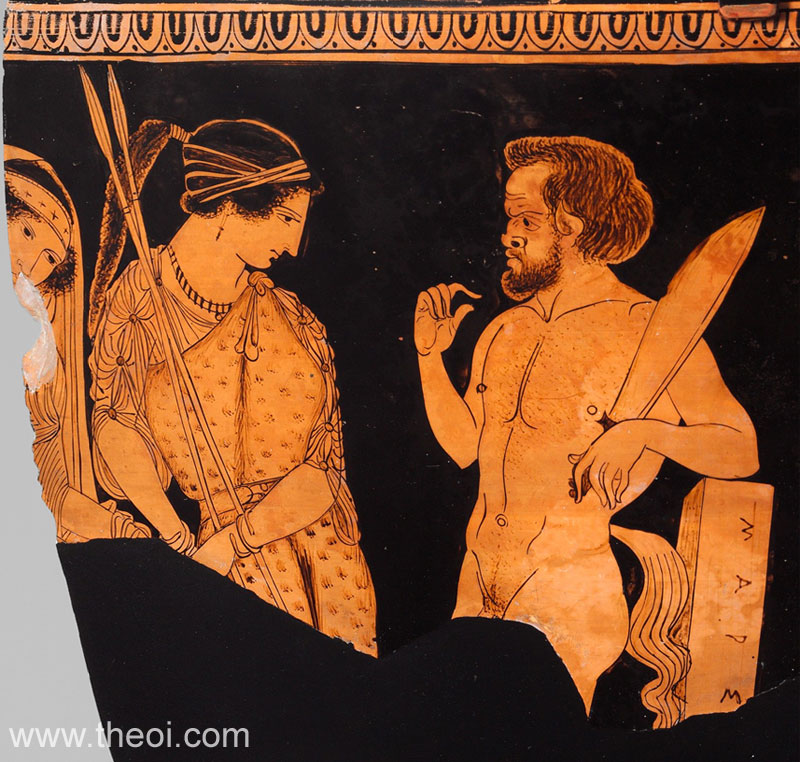
Pseudo-Apollodorus, Bibliotheca 1. 24 (trans. Aldrich) (Greek mythographer C2nd A.D.)
:
"Apollon also slew Marsyas, the son of Olympos. This fellow had come upon the flute which Athene had thrown
away because it made her face misshapen, and he proceeded to face Apollon in a musical contest. It was decided
that the winner could do whatever he wanted with the loser. During the contest Apollon played lyre in a reverse
position, and invited Marsyas to do the same. But Marsyas was incapable of this feat, and so Apollon won. He
finished off Marsyas by hanging him from a lofty pine and flaying him."
Telestes, Fragment 805 (from Athenaeus, Scholars at Dinner) (trans. Campbell, Vol.
Greek Lyric V) (Greek lyric C5th B.C.) :
"I do not believe in my heart that the clever one, divine Athena took the clever instrument in the mountain
thickets and then in fear of eye-offending ugliness threw it from her hands to be the glory of the Nymphe-born,
hand-clapping beast Marsyas; for why should a keen yearning for lovely beauty distress her, to whom Klotho
(Clotho) had assigned a marriageless and childless virginity."
Herodotus, Histories 1. 14. 3 (trans. Godley) (Greek historian C5th B.C.)
:
"For Midas too made an offering [at Delphoi (Delphi)]: namely, the royal seat on which he sat to give
judgment [of the contest of Apollon and Marsyas], and a marvellous seat it is."
Herodotus, Histories 2. 26. 3 :
"[Across] the river Halys [into] Phrygia, they marched through that country to Kelainai (Celaenae), where
rises the source of the river Maiandros (Meander) and of another river no smaller, which is called Kataraktes
(Cataracts); it rises right in the market-place of Keleinai and issues into the Maiandros. The skin of Marsyas
the Silenos (Silen) also hangs there; the Phrygian story tells that it was flayed off him and hung up by
Apollon."
Plato, Euthydemus 285c (trans. Lamb) (Greek philosopher C4th B.C.) :
"I am ready to offer myself to be skinned . . . if my hide is not to end by being made into a
wine-skin, like that of Marsyas."
Plato, Laws 677d :
"One or two thousand years ago some of them [i.e. inventions] were revealed to Daidalos (Daedalus), some to
Orpheus, some to Palamedes, musical arts to Marsyas and Olympos, lyric to Amphion, and, in short, a vast number
of others to other persons."
Diodorus Siculus, Library of History 5. 75. 3 (trans. Oldfather) (Greek historian
C1st B.C.) :
"The contest in skill between Apollon and Marsyas, in which, we are told, Apollon was victorious and
thereupon exacted an excessive punishment of his defeated adversary, but he afterwards repented of this and,
tearing the strings from the lyre, for a time had nothing to do with its music."
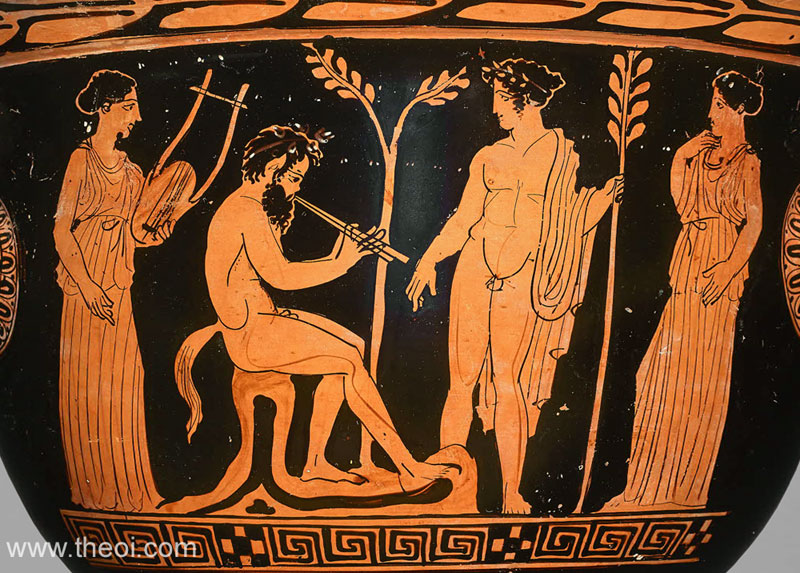
Strabo, Geography 10. 3. 14 (trans. Jones) (Greek geographer C1st B.C. to C1st A.D.)
:
"And when they [the poets] bring [the Satyrs] Silenos (Silenus) and Marsyas and Olympos into one and the
same connection [with Rhea and Dionysos], and make them the historical inventors of flutes, they again, a second
time, connect the Dionysiac and the Phrygian rites."
Strabo, Geography 12. 8. 15 :
"Apameia [in Phrygia] is situated near the outlets of the Marsyas River, which flows through the middle of
the city and has its sources in the city; it flows down to the suburbs, and then with violent and precipitate
current joins the Maiandros (Meander River) . . . And here is laid the scene of the myth of Olympos and of
Marsyas and of the contest between Marsyas and Apollon. Above is situated a lake which produces the reed that is
suitable for the mouth-pieces of pipes; and it is from this lake that pour the sources of both the Marsyas and
the Maiandros."
Pausanias, Description of Greece 1. 24. 1 (trans. Jones) (Greek travelogue C2nd A.D.)
:
"In this place [the Akropolis (Acropolis) of Athens] is a statue of Athena striking Marsyas the Silenos for
taking up the flutes that the goddess wished to be cast away for good."
Pausanias, Description of Greece 2. 7. 9 :
"The temple [of Apollon at Sikyon (Sicyon)] stands in the modern market-place . . . There is a story that
the flutes of Marsyas are dedicated here. When the Silenos met with his disaster, the river Marsyas carried the
flutes to the Maiandros (Meander); reappearing in the Asopos they were cast ashore in the Sikyonian territory
and given to Apollon by the shepherd who found them. I found none of these offerings still in existence, for
they were destroyed by fire when the temple was burnt."
Pausanias, Description of Greece 2. 22. 2 :
"Sakadas (Sacadas), who was the first to play at Delphoi (Delphi) the Pythian flute-tune; the hostility of
Apollon to flute-players, which had lasted ever since the rivalry of Marsyas the Silenos (Silen), is supposed to
have stayed because of Sakadas."
Pausanias, Description of Greece 8. 9. 1 :
"The Mantineans [of Mantinea, Arkadia (Arcadia)] possess a temple . . . of Leto and her children, and their
images were made by Praxiteles . . . On the pedestal of these are figures of the Mousai (Muses) together with
Marsyas playing the flute."
Pausanias, Description of Greece 10. 30. 9 :
"[Depicted in a painting by Polygnotos at Delphoi (Delphi) :] Marsyas, sitting on a rock, and by his side
is Olympos, with the appearance of a boy in the bloom of youth learning to play the flute. The Phrygians in
Kelainai (Celaenae) hold that the river [Marsyas] passing through the city was once this great flute-player, and
they also hold that the Song of the Mother [Rhea-Kybele], an air for the flute, was composed by
Marsyas. They say too that they repelled the army of the Gauls by the aid of Marsyas, who defended them against
the barbarians by the water from the river and by the music of his flute."
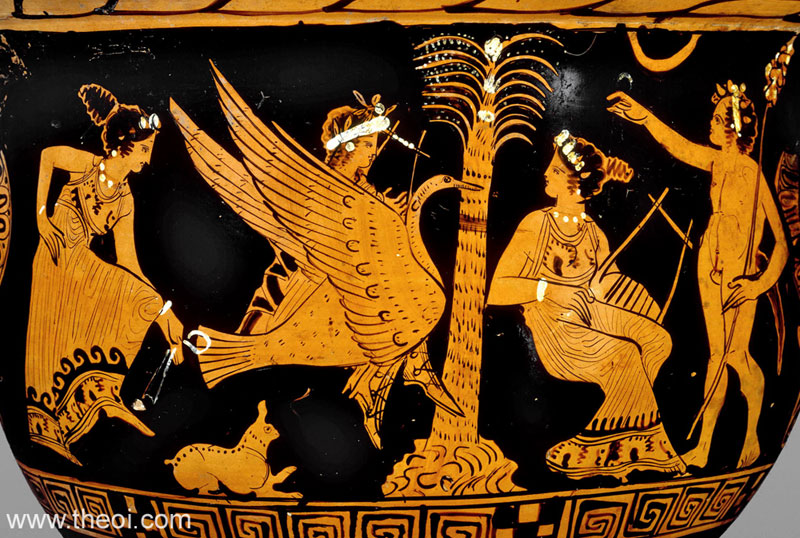
Plutarch, Life of Alcibiades 2. 5 (trans. Perrin) (Greek historian C1st to C2nd A.D.)
:
"[On flute-playing :] Athena for foundress and Apollon for patron, one of whom cast the flute away in
disgust, and the other flayed the presumptuous flute-player [Marsyas]."
Plutarch, On Music (trans. Campbell, Vol. Greek Lyric) (Greek historian C1st - 2nd
A.D.) :
"Olympos was the first to introduce instrumental music to Greece along with the Daktyloi Idaioi (Idaean
Dactyls): Hyagnis, he says was the first to play the pipes, then his son Marsyas, then Olympos."
Ptolemy Hephaestion, New History Book 3 (summary from Photius, Myriobiblon 190)
(trans. Pearse) (Greek mythographer C1st to C2nd A.D.) :
"Marsyas the flutist, the one who was flayed, was born during a festival of Apollon, where the skins of all
those victims one has flayed are offered to the god."
Aelian, Historical Miscellany 13. 21 (trans. Wilson) (Greek rhetorician C2nd to 3rd
A.D.) :
"Note that at Kelainai (Celaenae) if someone plays a Phrygian tune in the vicinity of the Phrygian's
[Marsyas'] skin, the skin moves. But if one plays in honour of Apollon, it is motionless and seems deaf."
Philostratus the Elder, Imagines 1. 20 (trans. Fairbanks) (Greek rhetorician C3rd
A.D.) :
"The place is Kelainai (Celaenae), if one may judge by the springs and the cave; but Marsyas has gone away
either to watch his sheep or because the contest is over. Do not praise the water; for, though it looks sweet
and placid, you will find [the flautist] Olympos sweeter. He sleeps after having played his flute, a tender
youth lying on tender flowers . . . A band of Satyroi (Satyrs) gaze lovingly upon the youth."
Philostratus the Younger, Imagines 2 (trans. Fairbanks) (Greek rhetorician C3rd A.D.)
:
"[Ostensibly a description of an ancient Greek painting :] Marsyas. The Phrygian has been overcome; at any
rate his glance is that of a man already perished, since he knows what he is to suffer, and he realizes that he
has played the flute for the last time, inasmuch as inopportunely he acted with effrontery toward [Apollon] the
son of Leto. His flute has been thrown away, condemned never to be played again, since just now it has been
convicted of playing out of tune. And he stands near the pine tree from which he knows he will be suspended, he
himself having named this penalty for himself--to be skinned for a wine-sack. He glances furtively at the
barbarian yonder who is whetting the edge of the knife to be applied to him; for you see, I am sure, that the
man's hands are on the whetstone and the iron, but that he looks up at Marsyas with glaring eyes, his wild and
squalid hair all bristling. The red on his cheek betokens, I think, a man thirsty for blood, and his eyebrow
overhands the eye, all contracted as it faces the light and giving a certain stamp to his anger; nay, he grins,
too, a savage grin in anticipation of what he is about to do--I am not sure whether because he is glad or
because his mind swells in pride as he looks forward to the slaughter. But Apollon is painted as resting upon a
rock; the lyre which lies on his left arm is still being struck by his left hand in gentle fashion, as though
playing a tune. You see the relaxed form of the god and the smile lighting up his face; his right hand rests on
his lap, gently grasping the plectrum, relaxed because of his joy in the victory. Here also is the river which
is to change its name to that of Marsyas. And look, please, at the band of Satyroi (Satyrs), how they are
represented as bewailing Marsyas, but as displaying, along with their grief, their playful spirit and their
disposition to leap about."
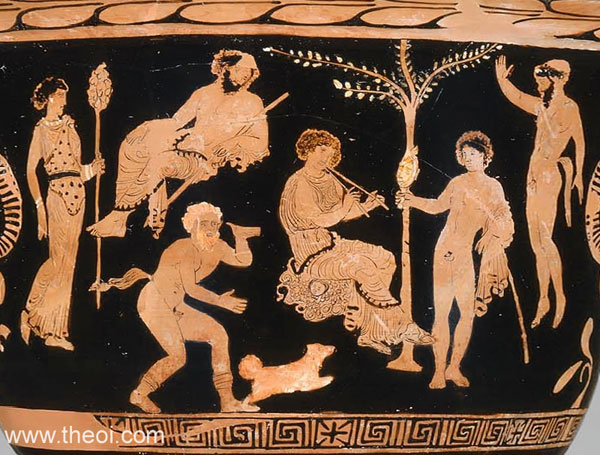
Pseudo-Hyginus, Fabulae 165 (trans. Grant) (Roman mythographer C2nd A.D.)
:
"[Athena] threw away the pipes [she had invented] and vowed that whoever picked them up should be punished
severly. Marsyas, a shepherd, son of Oeagrus, one of the Satyri, found them, and by practicing assiduously kept
making sweeter sounds day by day, so that he challenged Apollo to play the lyre in a contest with him. When
Apollo came there, they took the Musae (Muses) as judges. Marsyas was departing as victor, when Apollo turned
his lyre upside down, and played the same tune--a thing which Marsyas couldn't do with the pipes. And so Apollo
defeated Marsyas, bound him to a tree, and turned him over to a Scythian who stripped his skin off him limb by
limb. He gave the rest of his body for burial to his pupil Olympus. From his blood the river Marsyas took its
name."
Pseudo-Hyginus, Fabulae 191 :
"Midas, Mygdonian king, son of the Mother goddess from Timolus (Tmolus) was taken as judge at the time when
Apollo contested with Marsyas, or Pan, on the pipes. When Timolus gave the victory to Apollo, Midas said it
should rather have been given to Marsyas. Then Apollo angrily said to Midas : ‘You will have ears to match
the mind you have in judging,’ and with these words he caused him to have ass's ears."
Ovid, Metamorphoses 6. 382 ff (trans. Melville) (Roman epic C1st B.C. to C1st A.D.)
:
"Someone recalled the Satyrus (Satyr) who had lost to Latous [Apollon son of Leto] the contest when he
played Tritonia's [Athena's] pipe, and paid the penalty. ‘No! no!’ he screamed, ‘Why tear me
from myself? Oh, I repent! A pipe's not worth the price!’ and as he screamed Apollo stripped his skin; the
whole of him was one huge wound, blood streaming everywhere, sinews laid bare, veins naked, quivering and
pulsing. You could count his twitching guts, and the tissues as the light shone through his ribs. The
countryfolk, the Sylvan Deities (Numina Silvarum), the Fauni [Panes] and brother Satyri (Satyrs) and
the Nymphae (NYmphs), were all in tears, Olympus too, still loved, and every swain who fed his fleecy flocks and
long-horned cattle on those mountainsides. The fertile earth grew moist and, moistened, held their falling tears
and drank them deep into her veins and, changing them to water there, issued them forth into the open air; and
thence a river hurries to the sea through falling banks, the river Marsyas, the freshest, clearest stream of
Phrygia."
Ovid, Fasti 6. 697 ff (trans.Boyle) (Roman poetry C1st B.C. to C1st A.D.)
:
"I [Athena] first enabled the long flute to produce notes through spaced holes in perforated boxwood. The
sound pleased; but the limpid waters reflected my face, and I glimpsed puffed virgin cheeks. ‘Art is not
worth this to me; farewell, my flute,’ I said. The bank receives my cast-off on its turf. A Satyrus
(Satyr) [Marsyas] finds it and marvels at first, ignorant of its use. He learns that breath creates sound; and,
fingering the pipe, he blows and draws in air. And now boasted of his art to the Nymphae (Nymphs). He challenges
Phoebus [Apollon], too. Phoebus won, he hung. His flayed limbs separated from their skin."
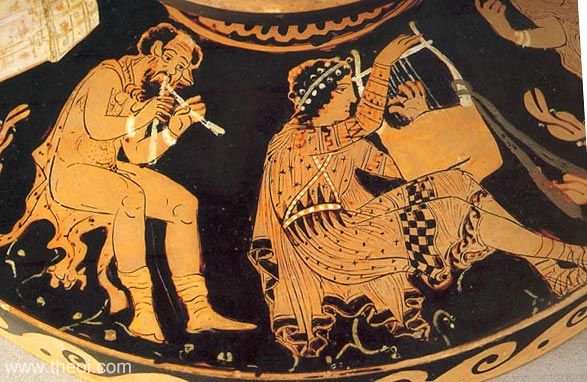
Pliny the Elder, Natural History 5. 106 (trans. Rackham) (Roman encyclopedia C1st
A.D.) :
"Apamea [a town in Karia (Caria)], previously called Celaenae . . . Apamea is situated at the foot of Mount
Signia, with the rivers Marsyas, Obrima and Orba, tributaries of the Maeandrus, flowing round it; the Marsyas
here merges from underground, and buries itself again a little later. Aulocrene (the Flute-Spring) is the place
where Marsyas had a contest in flute-playing with Apollo: it is the name given to a gorge 10 miles from Apamea,
on the way to Phrygia."
Pliny the Elder, Natural History 7. 204 (trans. Rackham) (Roman encyclopedia C1st
A.D.) :
"[On inventions :] Pan son of Mercurius [Hermes] [invented] the pipe and single flute, Midas in Phrygia the
slanting flute, Marsyas in the same nation the double-flute, Amphion the Lydian modes, the Thracian Thamyris the
Dorian, Marsyas of Phrygia the Phrygian."
Statius, Thebaid 4. 184 ff (trans. Mozley) (Roman epic C1st A.D.) :
"Who may despise deities met face to face?--for that he [the bard Thamyris] knew not what it was to strive
with Phoebus, nor how the hanging Satyrus [Marsyas] brought Celaenae fame."
Statius, Silvae 5. 3. 87 (trans. Mozley) (Roman poetry C1st A.D.) :
"He [Marsyas] who dared make music against Phoebus [Apollon], while Pallas [Athena] rejoiced that the
boxwood-pipe deceived him."
Nonnus, Dionysiaca 1. 41 ff (trans. Rouse) (Greek epic C5th A.D.) :
"He [Apollon] rejects the sound of breathing reeds, ever since he put to shame Marsyas and his god-defiant
pipes, and bared every limb of the skin-stript shepherd, and hung his skin on a tree to belly in the
breezes."
Nonnus, Dionysiaca 10. 232 ff :
"The Mygdonian flutist [Marsyas] whom divine Hyagnis begat, who to his cost challenged Phoibos (Phoebus)
[Apollon] as he pressed the fingerholes on Athene's double pipe."
Nonnus, Dionysiaca 19. 317 ff :
"Foolish one, who taught you to strive with your betters? Another Seilenos (Silen) there was [Marsyas],
fingering a proud pipe, who lifted a haughty neck and challenged a match with Phoibos (Phoebus) [Apollon]; but
Phoibos tied him to a tree and stript off his hairy skin, and made it a windbag. There it hung high on a tree,
and the breeze often entered, swelling it out into a shape like his, as if the shepherd could not keep silence
but made his tune again. Then Delphic Apollon changed his form in pity, and made him the river which bears his
name [the Marsyas which flows into the Maiandros (Meander) river]. Men still speak of the winding water of that
hairy Seilenos, which lets out a sound wandering on the wind, as if he were still playing on the reeds of his
Phrygian pipe in rivalry."
ANCIENT GREEK & ROMAN ART
SOURCES
GREEK
- Greek Lyric V Telestes, Fragments - Greek Lyric C5th B.C.
- Herodotus, Histories - Greek History C5th B.C.
- Plato, Euthydemus - Greek Philosophy C4th B.C.
- Plato, Laws - Greek Philosophy C4th B.C.
- Apollodorus, The Library - Greek Mythography C2nd A.D.
- Diodorus Siculus, The Library of History - Greek History C1st B.C.
- Strabo, Geography - Greek Geography C1st B.C. - C1st A.D.
- Pausanias, Description of Greece - Greek Travelogue C2nd A.D.
- Plutarch, Lives - Greek Historian C1st - 2nd A.D.
- Aelian, Historical Miscellany - Greek Rhetoric C2nd - 3rd A.D.
- Philostratus the Elder, Imagines - Greek Rhetoric C3rd A.D.
- Philostratus the Younger, Imagines - Greek Rhetoric C3rd A.D.
- Ptolemy Hephaestion, New History - Greek Mythography C1st - 2nd A.D.
- Nonnus, Dionysiaca - Greek Epic C5th A.D.
ROMAN
- Hyginus, Fabulae - Latin Mythography C2nd A.D.
- Ovid, Metamorphoses - Latin Epic C1st B.C. - C1st A.D.
- Ovid, Fasti - Latin Poetry C1st B.C. - C1st A.D.
- Pliny the Elder, Natural History - Latin Encyclopedia C1st A.D.
- Statius, Thebaid - Latin Epic C1st A.D.
- Statius, Silvae - Latin Poetry C1st A.D.
OTHER SOURCES
Other references not currently quoted here: Diodorus Siculus 3.59.1.
BIBLIOGRAPHY
A complete bibliography of the translations quoted on this page.
